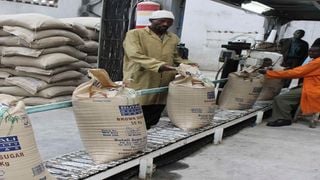
Workers packager sugar at Butali Sugar in Kakamega. The court has ordered rival West Kenya Sugar to pay Butali Sugar Sh507m following a protracted legal battle.
Business
Premium
How unlawful factory zoning rule landed Jaswant Rai in Sh507 million hole
Butali Sugar Mills planned to set up a milling plant in Malava, Kakamega in early 2000.
To put the plans in motion, the owners engaged experts including PKF Consulting Ltd, West Kenya Agro-Developers Consultants, and J.P. Mukherji & Associates to undertake various studies in readiness for opening the factory.
The firm went ahead and obtained relevant approvals for the development of the factory including a licence from the Kenya Sugar Board (KSB) and environmental impact assessment.
The company also started negotiations on the procurement of machinery as owners travelled to India to firm up the talks.
But as the company was about to start the construction, rival miller- West Kenya Sugar, which is owned by businessman Jaswant Rai moved to court and obtained an order stopping the development, pending the determination of the case.
The main argument by West Kenya, the maker of the Kabras sugar brand, was that the factory was to be set up within about 10 10-kilometre radius of its processing plant, a move that would interfere with its milling zone.
According to West Kenya, the registration of Butali’s planned sugar factory was contrary to a policy by the Ministry of Agriculture and KSB (formerly Kenya Sugar Authority) that no new factory be established within a 40-kilometre radius zone of an existing sugar milling plant.
The parties in June 2006 agreed to settle the matter by having Butali relocate its planned factory with West Kenya footing the cost. This didn’t happen triggering a multiplicity of court cases as the two firms claimed to have invested billions, employed workers, and contracted sugarcane growers. But in a judgment on September 1, 2023, High Court judge Alfred Mabeya said the orders obtained by West Kenya stopping the establishment of the factory based on zoning amounted to interference with Butali’s business.

West Kenya Sugar Chairman Jaswant Singh Rai.
“Was the order of 27/7/2005 warranted? I do not think so. The basis of the plaintiff’s argument was that there were exclusive sugar zones for the respective sugar millers. There was no evidence to show that there existed such a policy. If there was, the same was protectionist and unlawful” he said.
According to Justice Mabeya, it was clear that the application filed by West Kenya, seeking to challenge the licence granted to Butali by KSB, was directed at preventing the firm from opening or operating any sugar mill.
“Accordingly, the court is satisfied that from the evidence on record, the plaintiff was able to show that as of July 2005, it was ready, able, and willing to commence the construction of the factory,” said the judge.
“That the assurances and representations relied on by the plaintiff were unlawful and had no basis in law. The fears of lack of cane to support both factories were also proved to be misplaced.
“Accordingly, I make a finding that there was unlawful interference with the plaintiff’s business,” added Justice Mabeya.
The judge said Butali Sugar could not be faulted for ceasing or refraining from undertaking any further steps towards the establishment of the sugar mill until the order was lifted.
Evidence presented in court was that Butali obtained all the necessary approvals by July 2005, the last one being the environmental impact assessment licence, which it got on July 11, 2005, having submitted it a year earlier.
Justice Mabeya said Butali proved that it was financially ready to commence the building of the factory, at an estimated cost of Sh450 million, with the owners investing Sh150 million and the balance would be obtained through financing.
To buttress its case, Butali called two witnesses, Atul Shah, the managing director of PKF Consulting Ltd, and Jayantilal Patel, its managing director.
Vested rights
Mr Shah said the claims were for loss of profits at Sh135.9 million, escalation in costs of Sh171.5 million, increase in construction costs estimated at Sh39.7 million, and loss of profits due to an increase in the sale of sugar, among other costs.
Mr Patel said the infrastructure works began in 2007 but because of other interferences, the works were completed in 2010 and the mill was commissioned in 2012.
West Kenya’s Jaswant Rai testified that the registration was contrary to KSB’s four previous decisions declining to grant the rival a licence to operate a mill within its zone.
Mr Rai contended that he has operated a sugar factory at South Kabras, Kakamega since 1979 and that under the Crop Production and Livestock Act, no licence could be granted to set up a factory within 25 kilometre from an existing factory.
He further testified that the Sugar Act 2001 did not compromise the vested rights of the existing sugar factories and in a letter dated October 11, 2000, the Ministry of Agriculture allegedly demarcated to West Kenya its sugar zone.
Mr Rai said he lodged the case to protect and further its business interests and the matter was later compromised and Butali asked to relocate its factory from its site. He added that from the assurances, he had made investments worth Sh3.5 billion.
A KSB official told the court that there is no sugar licence attached to any exclusive zone and Butali was properly licensed.
“I hold that in so far as the second defendant (KSB) made representations and assurances to the first defendant (West Kenya), which made the latter belligerently assert that there were sugar zones for which it was exclusively entitled to a portion, which was not the case both in law and fact, the second defendant cannot escape the consequences,” the judge said.
He said KSB has to shoulder some blame for its acts, which led West Kenya to the disastrous misadventure.
The judge went ahead and directed West Kenya to compensate the rival miller Sh507 million for loss of business among other costs, during the period in which the construction plans were put on hold.
Justice Mabeya also ruled that KSB cannot escape blame and ordered the board to foot 30 per cent of the compensation, while West Kenya pays the rest.
The amount will run into billions as the judge said the amount would attract the interest of 12 per cent per annum since the case was filed in 2007 until payment in full.





